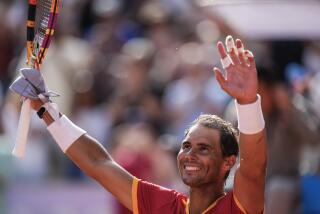Novak Djokovic broke up tennis’ Big Two, became its Big One
- Share via
This top gun was supposed to be a wingman. Instead, Novak Djokovic became an interloper.
Three or four years ago, the men’s game was clearly the property of Roger Federer and Rafael Nadal. They were the royalty. Federer had served his time on the throne majestically, and the younger Nadal, all power and spunk and sex appeal and charm, was tugging on the royal robe.
The ascension seemed scripted, established, kind of like with English kings. The Johns and the Henrys were established. But along came a lionhearted player from Serbia, with a personality as compelling as his predecessors’ and a name beginning with two consonants. He was supposed to wait his turn, to understand and appreciate his four years as No. 3 and not rush things.
Realistically, with Federer’s game aging like fine forehands and Nadal a mere 11 months older, Djokovic could have easily come to the conclusion that he would not have an era of his own. It would have been simple, and understandable, to rationalize that No. 3 was pretty heady stuff and that a couple of Grand Slams and millions of dollars in prize money would be plenty to talk about when he put his grandchildren on his knee.
Then came 2011 and the stunning emergence of Djokovic, quickly labeled by previous disbelievers as Novak No Joke. He got the last laugh on a tour that, notwithstanding Federer and Nadal, is so good and deep in quality players that a top-to-bottom analysis of it is best summed up in a John McEnroe-ism.
You cannot be serious.
Djokovic didn’t dominate, he destroyed. Against him, tennis rackets seemed insufficient weapons. Perhaps a whip and a chair?
He won the first 41 matches he played in 2011. If you add in his two singles victories in the 2010 Davis Cup final, won by Serbia, it was 43 in a row. That included the Australian Open title. The run didn’t end until Federer beat him in the semifinals of the French Open.
That was merely a pause. He ended up winning 10 titles, including back-to-back Masters Series events at Indian Wells and Miami, followed by victories at the last two majors, Wimbledon and the U.S. Open. That added up to a 70-6 record for the year and a bank account, from tournament purses alone, of $12,619,803.
He was 24, and the coveted No. 1 that didn’t appear to be in the script for Djokovic came right after his Wimbledon title.
“I always believed,” he says now. “It just wasn’t enough. I knew in the back of my mind that I wouldn’t be satisfied with No. 3.”
The demolition derby that he engineered has resulted in some startling statistics, especially when facing the previous royalty. When he beat Nadal to win this year’s Australian, it was his seventh straight victory over the once-untouchable Spaniard. He was also 4-1 against Federer in 2011. At the moment, Nadal holds a 16-14 overall advantage and Federer is 14-10 against Djokovic.
Chances are, those statistics will change next week, as the BNP Paribas Open winds to a finish. Djokovic is seeded No. 1, and were form to hold, he would play No. 4 Andy Murray in a semifinal. Getting through that, he could await the winner of yet another Federer-Nadal dogfight in the other semifinal.
If the old royalty and the new royalty do, indeed, survive to the weekend, expect all 16,100 seats in the Indian Wells Garden to be filled and rocking.
Saturday, Djokovic made his way through his first test with a 6-3, 6-2 win over qualifier Andrey Golubev. The stadium was full and buzzing until the rout became obvious — this for a match between a guy from Serbia and a guy from Kazakhstan. That was a tribute both to the drawing power of Djokovic and of this sun-splashed tournament.
Djokovic’s playing style combines speed, quickness and power. He is tennis’ Muhammad Ali — he floats like a butterfly, stings like a bee and wins with a swagger.
Saturday’s victory made Djokovic’s 2012 record 11-1 and spoke to some remaining goals — the French Open and the Olympics. Were he to win the French, he would join some pretty fast company — Federer, Nadal, Rod Laver, Roy Emerson, Fred Perry and Andre Agassi — as winners of at least one title in all four majors. If he were to also win the Olympic gold medal, he would become the third male in history to have all four Grand Slams and an Olympic gold in singles. His predecessors are Agassi and Nadal.
Two years ago, those goals would have been pipe dreams.
“I went through the tough times, where I didn’t really know if I could make it,” he says, “if I can, you know, overcome the two biggest rivals and two most dominant players in the game in the last seven, eight years.”
Overcome he has, in startling fashion.
“There was always belief in me that I could do it,” he says.
For awhile, he and family and close friends were the only ones on that bandwagon. Now, you’d probably even get grudging nods from guys named Federer and Nadal.
More to Read
Go beyond the scoreboard
Get the latest on L.A.'s teams in the daily Sports Report newsletter.
You may occasionally receive promotional content from the Los Angeles Times.











